- Home
- About
- Student Led
- Research Informed
- Practice Focused
- Resources
- News
- Green Campus Podcasts
- Case Studies
- Green Labs Community
News
Education for Sustainable Development: Co-Creating Common Areas of Need and Concern
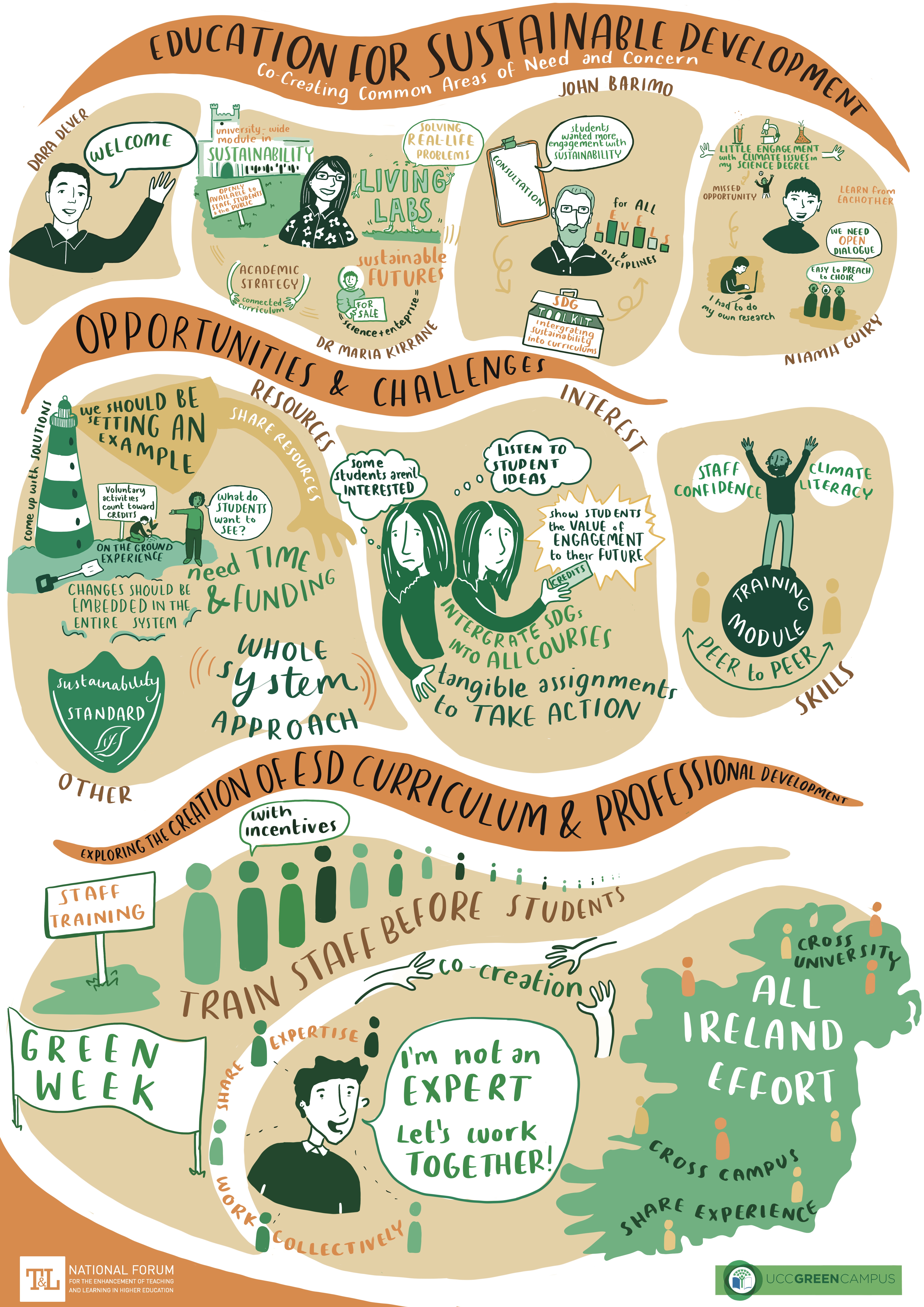
Education for Sustainable Development: Co-Creating Common Areas of Need and Concern
Synthesis Report - February 2022
Authors: Niamh Guiry, John Barimo, Edmond Byrne, Catherine O’Mahony, Darren Reidy, Dara Dever, Ger Mullally, Maria Kirrane, and Michael John O’Mahony.

Education has become an essential tool in the fight against climate change and in achieving critical sustainable development goals. Without knowledge of the intricacies of the biodiversity crisis, climate science, and the interconnected social justice issues associated with environmental degradation, how can we create innovative solutions to address these complex problems?
Education for Sustainable Development (ESD) works to equip learners with the relevant knowledge, skills, values, and attitudes needed to create a sustainable and equitable world for all. The significance of ESD has been recognised at an international level and it has even been amalgamated into target 4.7 of Sustainable Development Goal (SDG) 4:
‘By 2030, ensure that all learners acquire the knowledge and skills needed to promote sustainable development, including, among others, through education for sustainable development and sustainable lifestyles, human rights, gender equality, promotion of a culture of peace and non-violence, global citizenship and appreciation of cultural diversity and of culture’s contribution to sustainable development’[1].
ESD takes an inclusive, interdisciplinary, and collaborative approach to solving our most pressing sustainability challenges. It aims to promote critical thinking and works to integrate its inclusive values into all teaching and learning activities. ESD is not a new phenomenon. The concept of sustainable development was defined in 1987 by the Brundtland Commission and education centred around sustainable development evolved from environmental education, which worked to empower individuals to care for the natural world[2].
Ireland’s National Strategy for ESD 2014 - 2020 recognises the ability of ESD to empower individuals to become proactive agents of change and promotes ‘education for sustainable development rather than education about sustainable development’[3]. Given the critical nature of the ever-growing climate emergency, there is a clear and immediate need to educate current and future generations in Ireland on the intricacies of climate change and its associated social justice issues.
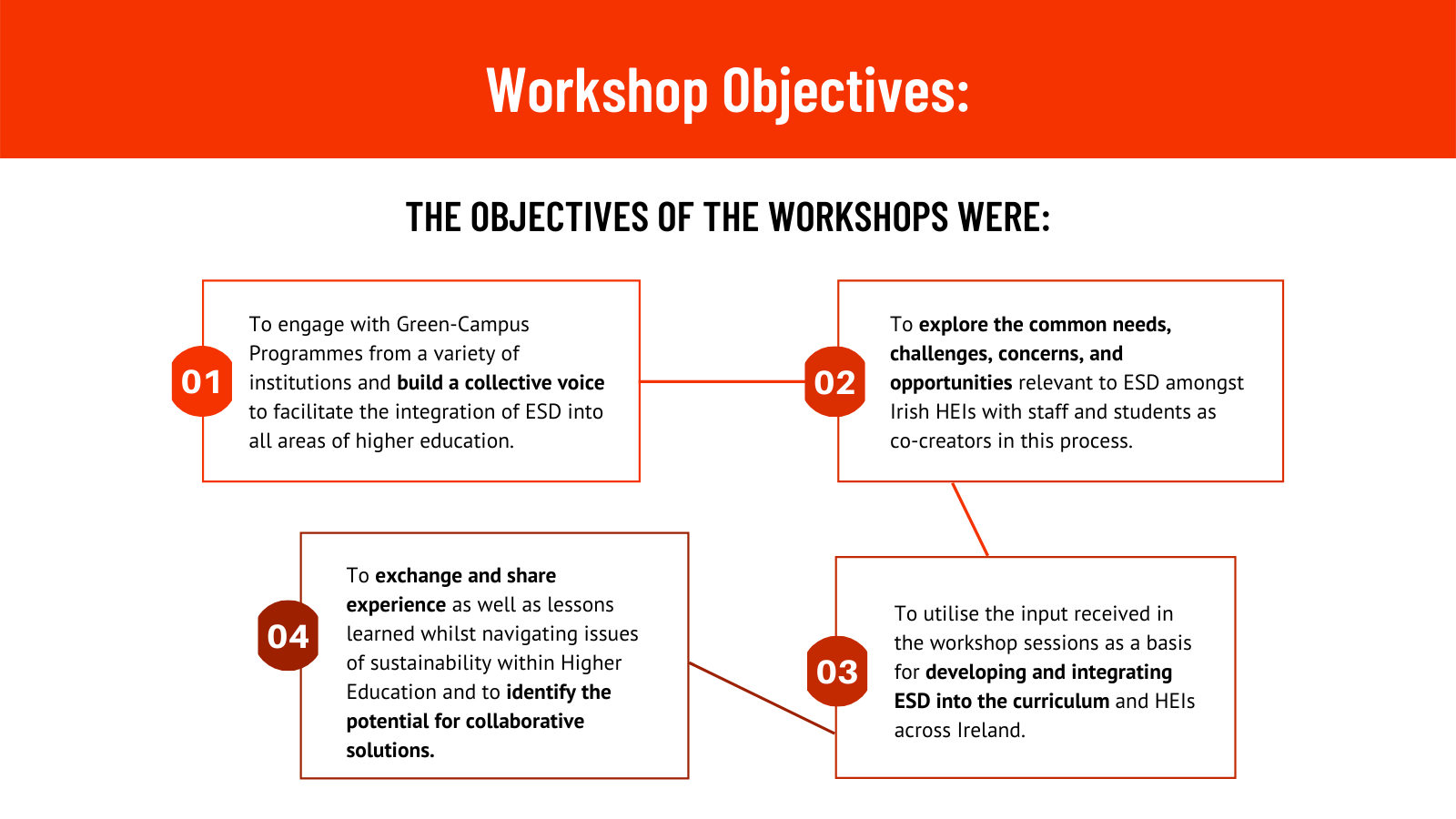
The synthesis report ‘Education for Sustainable Development: Co-Creating Common Areas of Need and Concern’ is based on two virtual workshops that were run by UCC Green Campus and Green-Campus Ireland in November 2021. These workshops had participants from a range of further and higher-level institutions who came together to participate in open dialogue to explore the common challenges and opportunities related to the integration of ESD into third-level education in Ireland. The findings of this report are based on the information collected from students and staff during the workshop discussions.
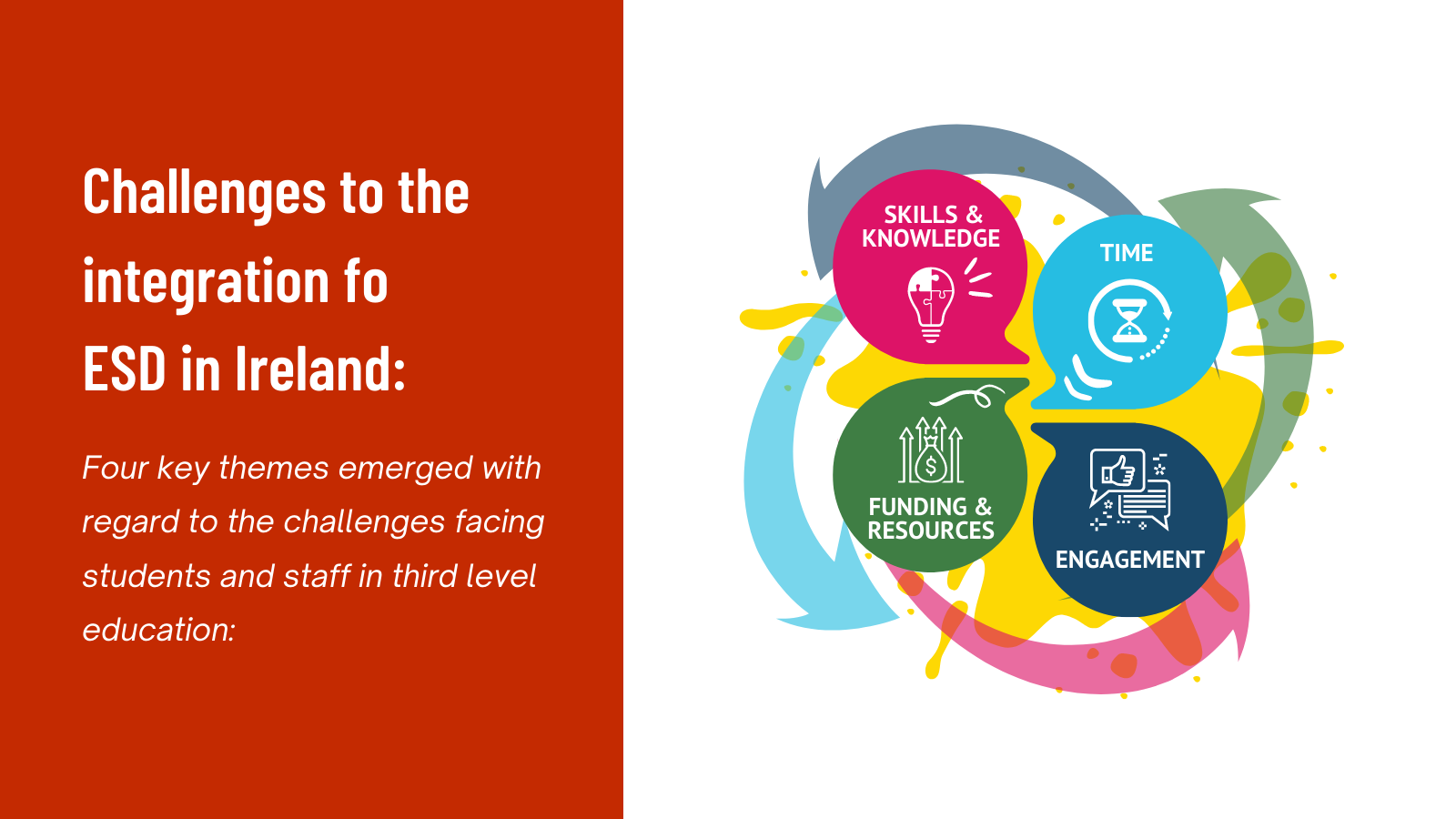
Main Findings of the Synthesis Report:
The following are the main challenges that were identified at the workshop sessions related to integrating ESD in Ireland:
- Many staff currently lack the skills and knowledge necessary to integrate sustainability into the curriculum.
- Lack of free time available to staff and students to engage with sustainability, both academically and through extracurricular activities.
- Insufficient resources, including funding and training for ESD. The absence of dedicated ESD Officers was highlighted as a major deficiency in our current higher education system.
- Inadequate support and commitment of higher management to ESD and sustainability goals as strategic priorities within many HEIs.
- Engaging with students and staff who are not interested in sustainability is a persistent obstacle that must be overcome to successfully integrate ESD across all disciplines.
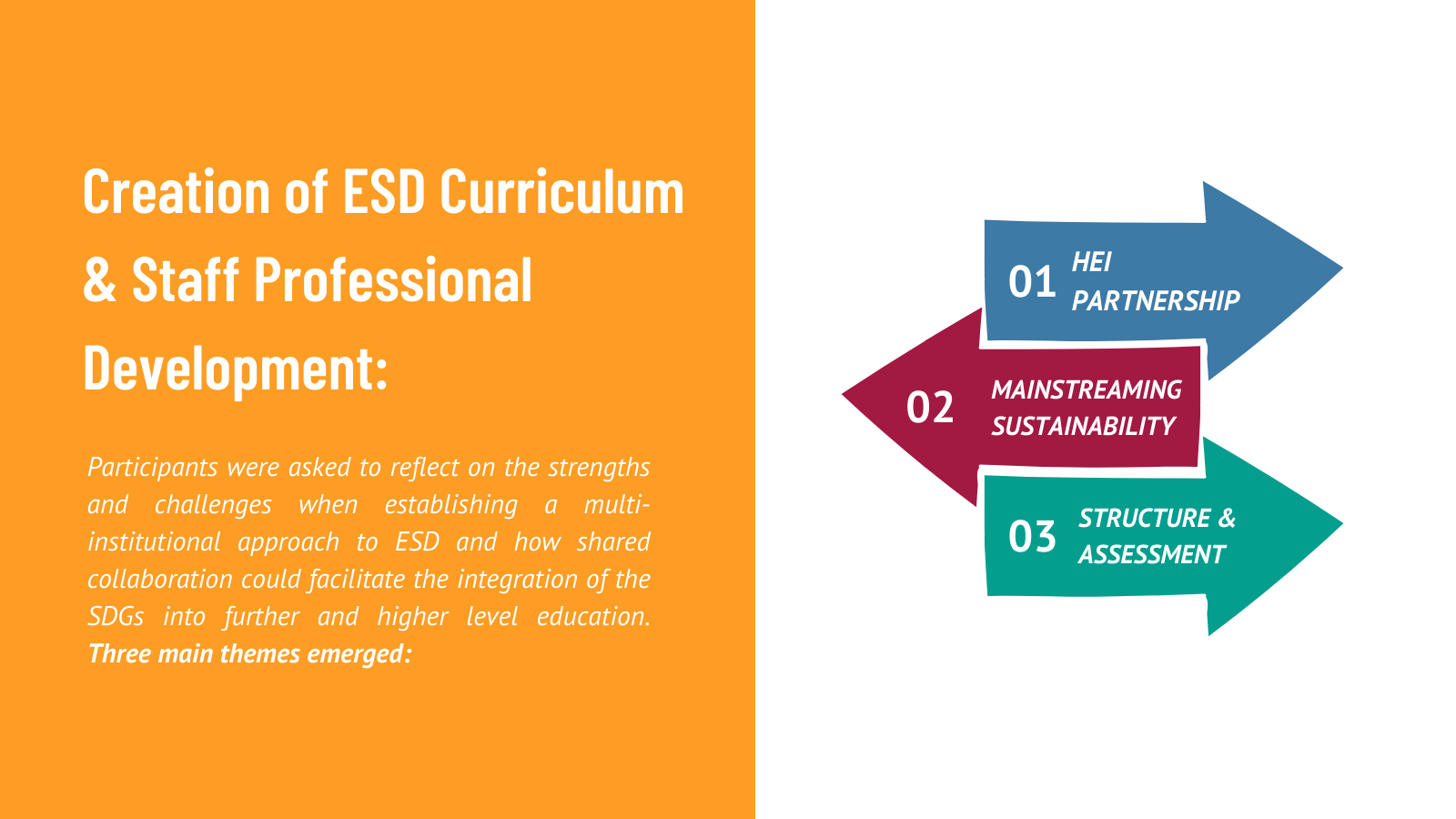
There are many opportunities available when integrating ESD into the curriculum:
- There is a great opportunity to provide professional development training to equip staff with essential knowledge around sustainability that can be incorporated into their teachings.
- The interdisciplinary nature of ESD will allow HEIs to work together using the existing Green-Campus Network to collaboratively create an ESD curriculum and CPD training that draws on the strengths of various HEIs.
- There is ample scope for the development of a sustainability standard across all HEIs to facilitate the amalgamation of ESD into the curriculum.
The principal barriers and opportunities that exist in relation to creating an ESD curriculum and facilitating Staff Professional Development were also identified:
- An all-Ireland HEI partnership is essential in the ESD development process. It will be difficult to coordinate all HEIs but all institutes must be included to design an inclusive and engaging ESD curriculum.
- The curriculum needs to be designed in a transparent manner to build trust and support for the integration of sustainable development into third-level education.
- Students are key stakeholders that hold valuable insight into the Irish academic experience. There is great opportunity to facilitate peer-to-peer learning and the identification of ESD needs and gaps.
- Mandatory CPD would be effective in furthering ESD but it must be tailored to all skill levels.
- All changes made to modules will need to be approved by accreditation boards, which could slow down the creation of the ESD curriculum.
- Our approach to ESD must encompass the urgent nature of climate change.
Moving Forward:
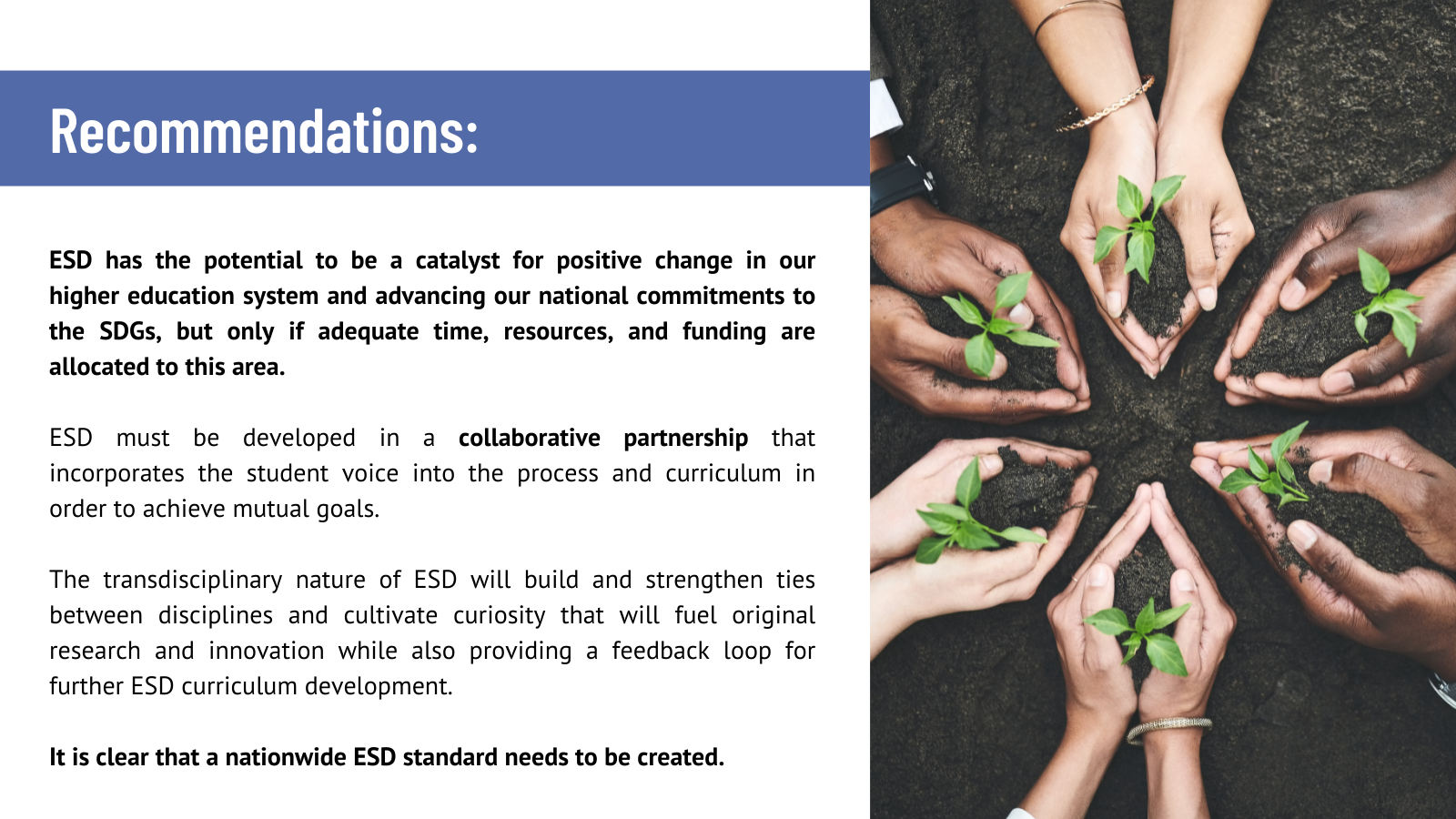
The findings of this report can be regarded as a call to action. ESD must be amalgamated into the building blocks of our third-level education system and our approach to sustainability issues should strive to empower individuals to become proactive and avoid falling into the trap of climate doomism[4].
The student voice is critical to the development of the curriculum for sustainable development. Students are key stakeholders in third-level education and they must be included as equal co-creators in this process. By using the ‘students as partners’ approach, we will be able to create an inclusive curriculum that supplies students with knowledge that they want (and need) for their future careers and personal lives.
Our approach to ESD needs to encompass the time-sensitive nature of climate change. We can only get so far with personal responsibility. Systemic change is desperately needed if we want to avoid the worst effects of climate change. A comprehensive ESD curriculum will enhance both teaching and learning experiences in our institutions in Ireland. By understanding the complexities of sustainable development and the interconnected goals, we can work together to shape our laws, regulations, communities, and actions to safeguard the planet and its inhabitants.
Empowering individuals to become active citizens is the goal of ESD that can be achieved if the challenges and opportunities identified through these workshops are acted on.
Read the full report here ESD Synthesis Report- Final.
—---------------------------------------------------------------------------------------------------------------------------Bio: Niamh Guiry is a recent LL.M Environmental and Natural Resources Law graduate. She currently works as a Research Support Officer in the Centre for the Integration of Research, Teaching and Learning in UCC and an intern for UCC Green Campus.
References:
- United Nations, SDGs - Goal 4 https://sdgs.un.org/goals/goal4
- Elaine Nevin, ‘Education and Sustainable Development’ (2008) Centre for Global Education https://www.developmenteducationreview.com/issue/issue-6/education-and-sustainable-development
- Department of Education and Skills, ‘Education for Sustainability’ The National Strategy on Education for Sustainable Development in Ireland, 2014 - 2020, p. 4 https://assets.gov.ie/24587/c82be92cea214b0789ce668c2c082c57.pdf
Read about climate doomism here: Michelle Russell, ‘Avoiding Climate Doomism’ PCMA (20 April 2021) https://www.pcma.org/avoiding-climate-doomism-michael-mann/
[1] United Nations, SDGs - Goal 4 https://sdgs.un.org/goals/goal4
[2] Elaine Nevin, ‘Education and Sustainable Development’ (2008) Centre for Global Education https://www.developmenteducationreview.com/issue/issue-6/education-and-sustainable-development
[3] Department of Education and Skills, ‘Education for Sustainability’ The National Strategy on Education for Sustainable Development in Ireland, 2014 - 2020, p. 4 https://assets.gov.ie/24587/c82be92cea214b0789ce668c2c082c57.pdf
[4] Read about climate doomism here: Michelle Russell, ‘Avoiding Climate Doomism’ PCMA (20 April 2021) https://www.pcma.org/avoiding-climate-doomism-michael-mann/
